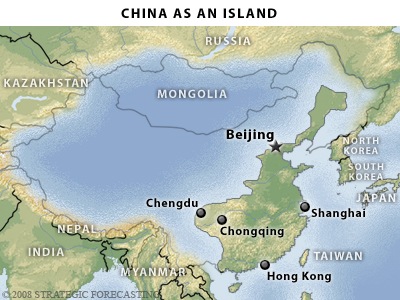
So says Kevin Kelly on what is now my favourite blog. Here’s why:
China shares borders with more countries (14 in total) than any other country on earth. Very few of those borders have ever been very permeable to migration of culture, commerce and ideas because of mountains, deserts, swamps, and high altitudes. In many ways China has acted as an island for millennia. The very large zone of an impermeable buffer, and mountainous and unfarmable land is shown in this image as water.
What’s left is the island of China. This is the traditional center of China, of fertile river valley farming, and home to the Han people. It is also the zone of manufacturing today. It is where all of its giant, throbbing cities lie. The island alone is huge, still among the largest countries in the world.
Prosperity in China is found only on the island. Off the island, in the waters deep, China remains remarkably undeveloped. In fact the level of development in the “Chinese waters” is about equal to the low levels of the neighboring countries. I was surprised to find in my own travels that many towns in the Chinese waterland were as remote, poor, and disadvantaged as any places I had seen in Nepal, Burma, Bangladesh, Pakistan, Afghanistan — all neighbors of China. Not coincidentally, this waterland is also inhabited by non-Han peoples, what the Chinese call their minorities. It is not just Tibet where the nan-Han are outnumbered. In most of the counties covered by this buffer zone (shown as water), minorities dominate. There are lots of them, speaking their own language, often their own dress. What is most remarkable is how remote the rich island seems from the outer waterlands.
The China everyone talks about is the island. China’s worry is the outer zone will leave. Will they go the way of the Soviet Union and break off one by one? Will there be two futures? Much of the control-freak nature of the central political party has been trying — at almost all costs — to keep the whole waterland under control of the island — to keep the country intact. And when you look at this map, it is clear that a break up, or at least a break down, is a very real possibility. In fact the more you look at it, the more amazing it is that China has not devolved before now.



